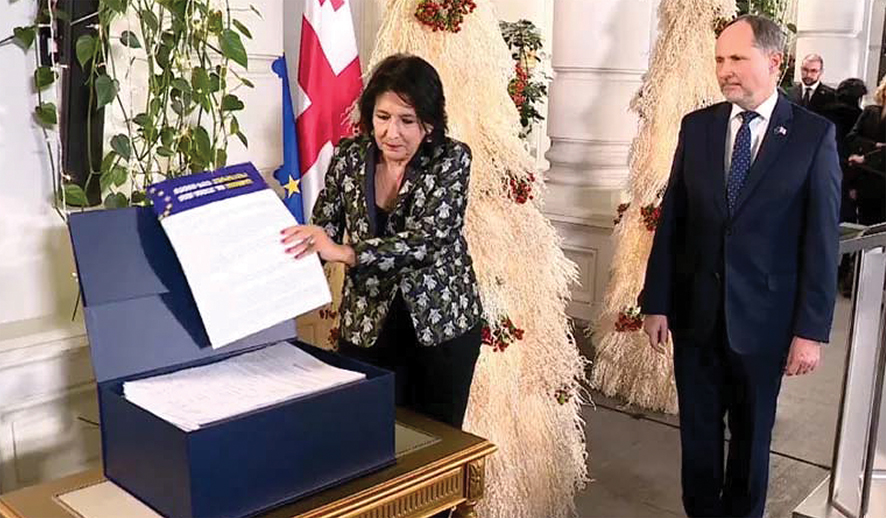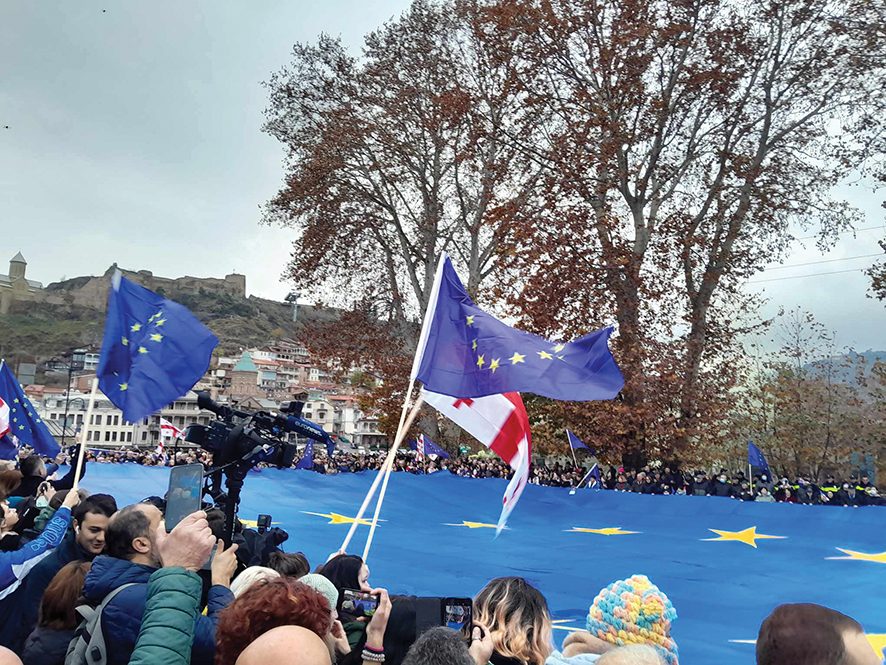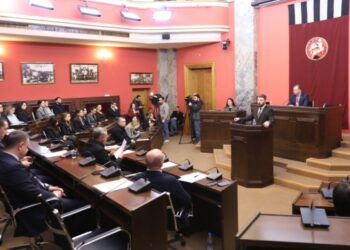December 15 marks a watershed moment in the modern history of Georgia – on this day, the EU is expected to announce its official decision regarding giving the country EU candidate status.
The importance of this decision for the country’s economy and brighter future lies in the fact that the EU is Georgia’s largest trading partner, and provides on average over €100 million to Georgia annually in technical and financial assistance.
Additionally, the EU remains firmly committed to its policy of supporting Georgia’s territorial integrity within its internationally recognized borders, as well as engagement with the breakaway regions of Abkhazia and South Ossetia, in support of longer-term conflict resolution. Since 2008, an EU Monitoring Mission has operated in the vicinity of the administrative boundary lines.
In the 2023 Enlargement Package, the European Commission recommended opening accession negotiations with Ukraine and Moldova, and to grant candidate status to Georgia, on the understanding that Georgia will then take certain steps.
The “Georgian Dream” government states that if Georgia receives the status, it will be primarily thanks to their work, while many experts and representatives of EU countries name the enthusiasm and will of the people and geopolitics as the key in this regard. People’s strong will towards EU integration was once again clearly confirmed during the rally supporting European integration (July 2023) and rallies opposing the adoption of “Russian Law” (March 2023) in Tbilisi.
Overall, Georgian and foreign politicians, public figures and experts are optimistic regarding the EU decision, claiming that the country and its people deserve the candidate status, and being a part of the European family is the common will of the Georgian people.
The recent NDI survey published on December 11, reveals that Georgian citizens are bound together by a shared commitment to European and Euro-Atlantic integration. The new survey, which was conducted before the European Commission’s November 8th decision, reaffirms the unwavering dedication of the Georgian people to European integration, with an impressive 79% expressing support for EU membership. Over the last year, public opinion trends show a significant increase in favor of political and economic cooperation with the EU.
Before the final decision is announced, predictions regarding candidacy looked pretty optimistic:
Georgian President Salome Zurabishvili on Wednesday expressed hope the European Council’s decision would be “positive” not only on granting Georgia the European Union membership candidate status but on opening accession negotiations with Ukraine and Moldova.
In her address at the closing event of the campaign Our Voice to Europe, which called on European leaders to grant Georgia the EU status, Zurabishvili noted the EU candidacy for Georgia would be the “beginning of a new life – entering the European family”.
The President launched a signature campaign titled Our Voice to Europe on November 8, following the European Commission’s recommendation to the European Council to grant the country the EU candidate status.
The petition was signed by more than 45,000 citizens, including currently imprisoned former President Mikheil Saakashvili and the representatives of the UNM party.

Zurabishvili highlighted that “any setback” on Georgia’s EU path would be “a step forward” for Russia, adding decisions regarding Georgia, Ukraine and Moldova would be “a very serious message from the EU amid Russia’s ongoing aggression against Ukraine.
“Any setback, any step back, is a step forward for Russia. This is the message that I want to send to our European friends, as well as to our American friends, because their decisions also regarding the war in Ukraine these days will send a very serious message. None of us – neither we here, nor you where you are – have the right to concede anything to Russia today. This is a crossroad. Georgia has gone through many stages to get here. This path did not start today, or yesterday, or on November 8, nor when we were given European Perspective last year: It started when we entered the OSCE with Zurab Zhvania’s [late former Georgia’s PM] famous speech at the Council’s meeting [where Zhvania said ‘I am Georgian, therefore I am European’],” President Zurabishvili noted.
The good news is that Georgia is advancing towards membership, stated the EU High Representative for Foreign Policy and Security, Joseph Borrell.
“Enlargement is our most important foreign policy. As a foreign policy official, enlargement is a precious, fundamental issue for me. We have had obligations to many people for a very long time, and we must hurry and fulfill them. What we have to do is to keep our promises, avoid disappointment and fulfill the expectations that have been created. Georgia is doing well. So far, all the analyses and proposals from the Commission have been very positive. We encourage Georgia to continue on this path,” the EU High Representative declared.
Borrell: We have had obligations to many people for a very long time, and we must hurry and fulfill them
Georgian Prime Minister Irakli Garibashvili on Wednesday addressed Charles Michel, the European Council President, Ursula von der Leyen, the President of the European Commission, Pedro Sánchez, the Spanish PM whose country chairs the Council of the EU, and leaders of the bloc’s member states to back his country’s EU candidacy in a “watershed moment” for its integration this week.
Expressing his “sincere gratitude” to the officials for supporting Georgia’s EU aspirations, the PM in a letter highlighted the June 2022 decision by the European Council to grant his country European Perspective had opened an “entirely new chapter” in relations with the bloc.
Expressing his “firm belief” that the EU would continue standing by Georgia by making “another historic decision” to grant the country candidate status at the end of this week, Garibashvili highlighted the move would put Georgia on an “irreversible track” towards accession negotiations to become a full-fledged member of the EU.

“This is a watershed moment for Georgia’s European future, and equally for the credibility of the EU’s enlargement policy as a geostrategic investment in peace, stability, and prosperity in the whole of Europe,” he noted.
“We have been hearing for a long time that the decision would be merit-based. The merit is obvious, and there is no backdrop but to expect only a positive decision,” said Georgian Parliament Speaker Shalva Papuashvili, emphasizing that Georgia deserves EU candidate status.
“The internal debate between different EU countries does not pose any obstacle to making a merit-based rather than out-of-spite decision regarding Georgia, i.e. when someone does not support something, the others get back at it by not supporting Georgia’s EU candidate status. The Georgian population expects the decision to be fair and no reoccurrence of the unfairness that happened last year,” he said.
EU Ambassador to Georgia, Paweł Herczynski, addressed the Georgian nation before the announcement of the decision on December 15: “Your voice is clearly heard in Brussels. Hopefully, it will be heard in the 27 capitals of the EU. I hope that our member states will follow the recommendation of the European Commission. As we all know, such historical decisions in the European Union require unity and consensus,” he declared.
US Ambassador to Georgia Robin L. Dunnigan said she was also “optimistic” about the December 15 decision.
“I’m very optimistic and hopeful that the vote in mid-December will be positive. Ultimately, it’s the Council’s decision, but I hope it’s positive. It is an important step forward in integration with the EU. It’s also an important step forward regarding Georgia’s NATO aspirations,” she noted.
Among the experts, Vano Chkhikvadze, Head of the Open Society Foundation’s European integration program, based on his own sources, said he was almost 100% sure that the decision regarding Georgia would be positive.
“A positive answer will come due to the great support of the Georgian people for the EU. If not for the people’s protest, the government would not have applied for membership [in March 2022], and if it were not for the people’s protest, the Georgian government would have passed the “Russian Law” [the Foreign Agents of Influence Law], which would have closed the way for European integration,” he claims.
Among other factors, he also mentions the EU’s geopolitical interest and desire not to disintegrate the “Association Trio” of Ukraine-Moldova-Georgia. “All this affects the final decision of the European Commission,” Chkhikvadze said.
Former member of the Georgian Dream coalition, former politician, Davit Zurabishvili, said that if the decision towards Georgia is positive, the credit will be go in this order:
• To the public support for European integration – “which is very strong and visible and this is an important factor”;
• To President Salome Zurabishvili – “Her merit is real on this path and people understand it well”;
• To the government.
Zurabishvili refers to the opposition “as more or less expressing the moods of the people” in the first item of this list.
Since the March rallies related to the so-called Law on Agents, international partners drew a line between the authorities and the people of Georgia, claiming that “the Georgian people deserve to receive the status” regardless of any un-EU-esque errors made or spoken by the ruling party. Now, the EU decision is expected to prove whether the efforts and dedication of the Georgian people has been rightfully appreciated, and, as PM Garibashvili noted, whether the EU is truly committed to making good on its promises for peace, stability, and prosperity for the whole of Europe.
By Ana Dumbadze (on 14/12, prior to the EU’s decision on Georgia’s candidacy)














